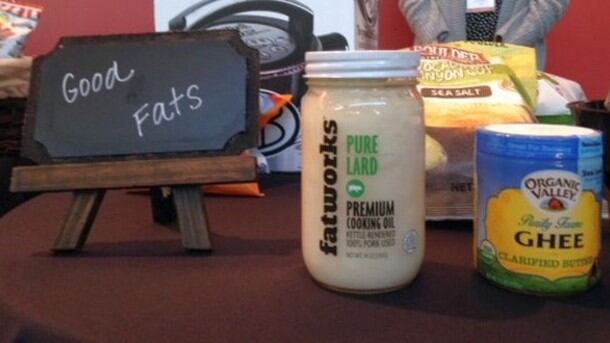To put this in perspective, a 14g serving serving of the canola oil would contain around 600mg of long-chain omega-3s (the daily recommended amount is 250-500mg/day), says Dow, which has been developing the crops with algae experts at DSM.
The race is on…
Currently, only ALA (alpha-linolenic acid), a short-chain omega-3 that is less bioavailable for humans, can be produced from plant sources such as walnuts, flax and chia.
The race has therefore been on to develop more cost-effective and sustainable plant-based sources of EPA and DHA enabling a broader set of consumers to get the EPA and DHA they need, and reducing pressure on fish stocks.
Historically, Dow AgroSciences’ commercial leader for grains & oils, David Dzisiak, told FoodNavigator-USA, research in this field has focused on identifying genes from algae or fungi that can be added to oilseed crops to enable them to convert the shorter chain omega-3 fatty acids found in plants {eg. ALA] into longer chain ones found in marine sources [eg. EPA/DHA], via an enzymatic process.
The problem with this approach, however, is that it results in plant oils containing substantial quantities of other polyunsaturated fatty acids (PUFAs) aside from EPA/DHA, which can create off tastes and oxidative instability, he said.
We’re effectively dropping in a new oil factory
Dow – in contrast - does not rely on sequential modification of native fatty acids in canola or a high level of ALA as a precursor, but instead “drops in” a package of genes from blue-green algae that enables canola plants to produce EPA and DHA without substantially altering the overall fatty acid profile of the final oil, he said.
“We’re effectively dropping in a new oil factory that can make EPA and DHA directly from basic feedstock in the plant.”
So aside from the small percentage of EPA/DHA in the final oil, its overall profile is otherwise very similar of regular canola oil (it just has a slightly lower percentage of oleic acid), he explained.
EPA/DHA levels remain meaningful after storage, processing
According to the letter in Nature Biotechnology, the levels of long chain omega-3s in the field-grown canola [up to 4.3% DHA and 0.6% EPA] “are commercially relevant, especially as we have demonstrated that the PUFA synthase system is robust across the complete production cycle from introduction into a mainstream oilseed crop through field cultivation, grain storage and processing to a finished oil.”
Dow has also tested field grown canola that has been stored at room temperature for nine months, processed and then deodorized, and found only a minimal drop in DHA content, adds the letter:
“Two batches of grain… were processed to yield 2.2 kg of RBD [refined, bleached and deodorized] canola oil that contained up to 3.7% DHA and 0.7% EPA. The DHA-enriched oil had a conventional canola fatty acid profile except for enrichment in the long chain-PUFAs derived from the microalgal PUFA synthase and had normal commercial quality attributes.”
Dow and DSM have also been experimenting with soybeans, where it has so far been able to produce oils containing up to 2.7% DHA and 1.5% EPA, added the report.
“Production of oils enriched with DHA using oilseed crops could be both more sustainable than farming fish and cheaper than fermentation-based sources.”
Timetable a secret
Asked when the oils might be commercialized and where Dow is in terms of securing regulatory approvals, Dzisiask said this was commercially sensitive information, but said: “As you can see, we are quite well advanced in the trait. The key is getting a meaningful amount so you don’t have to consume half a gallon of oil to get what you need.
“We see opportunities in bottled oil [for the retail and foodservice markets], salad dressings and any food product that people consume on a regular basis that has a high level of fat.”
The GMO-factor
Asked whether the GMO-factor would put some shoppers off, he said that products made with genetic engineering that promised a direct consumer benefit were typically viewed far more favorably in consumer research, while there was also a strong sustainability argument to be made for getting omega-3s from plants rather than fish oil.

“It will taste better, it will reduce the pressure on fish stocks, and it will bring omega-3s to a far wider audience. Not everyone likes fish, or wants to take supplements, or can afford to buy them.”
David Dzisiak, commercial leader for grains & oils, Dow AgroSciences
Professor: An advantage of this strategy is that it does not accumulate other intermediate fatty acids
Dr. Kan Wang, global biotechnology professor and director at the Center for Plant Transformation at Iowa State University, told FoodNavigator-USA that the development was exciting, especially as the new ‘drop-in’ process meant that the composition of the final oil was almost the same as regular canola.
In a written statement, she added: “What’s new in this work is the engineering strategy used by the Dow AgroSciences group. They introduced a large microalgae biosynthetic system that includes multiple proteins and enzymes into canola. This approach allows the engineered seeds to produce additional fatty acids instead of just converting existing fatty acids into polyunsaturated fatty acids, a strategy used in earlier efforts.
“Another advantage of this strategy is that it does not accumulate other intermediate fatty acids… [which] can increase oxidative instability of the oil and often are the culprit of off-flavors for oil products.”
While the DHA and EPA production levels in Dow’s system are lower than those produced by the past conversion strategies, she said, they are “high enough for commercialization.”
Cargill/BASF: We’ll get there by 2020!
Cargill - which has been working with BASF on a similar project since 2009 - told us last year that it is also making solid progress, with products likely to hit the market by 2020, subject to regulatory approvals, according to Willie Loh, VP, market development, Cargill Specialty Seeds & Oils.
He told us: “Cargill and BASF have been jointly working to develop canola oils containing long-chain omega-3 fatty acids (EPA and DHA) since 2009. BASF contributed the genes and associated intellectual property necessary for development of the novel oil. Cargill contributed its plant breeding, oil stabilization and processing technologies, and associated intellectual property.”
Source: Nature Biotechnology, (2016) doi:10.1038/nbt.3585, published online July 11
‘Canola engineered with a microalgal polyketide synthase-like system produces oil enriched in docosahexaenoic acid.’
Authors: Terence A Walsh, Scott A Bevan, Daniel J Gachotte, Cory M Larsen, William A Moskal, P A Owens Merlo, Lyudmila V Sidorenko, Ronnie E Hampton, Virginia Stoltz, Dayakar Pareddy, Geny I Anthony, Pudota B Bhaskar, Pradeep R Marri Lauren M Clark, Wei Chen, Patrick S Adu-Peasah, Steven T Wensing, Ross Zirkle & James G Metz.

